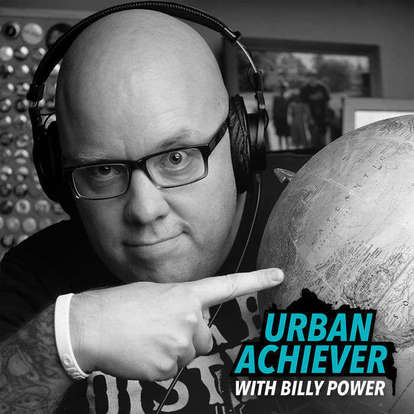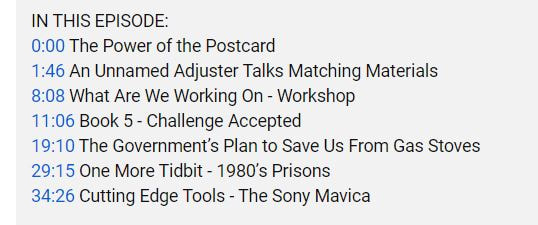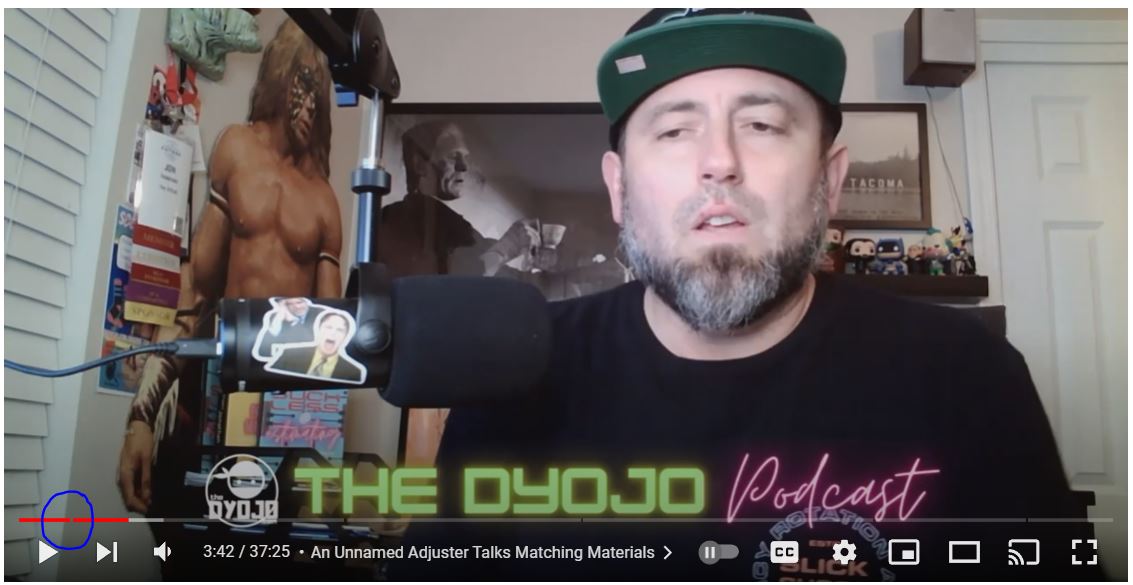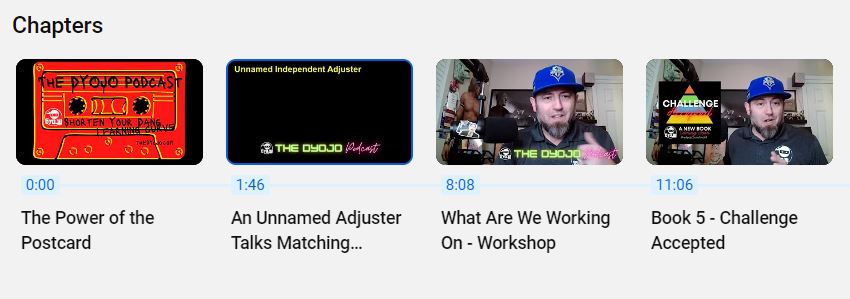|
You can divide YouTube videos into chapters to draw the viewers attention to key topics or segments. The simplest way that I have found to do this is by creating an episode set list in the description for the video. For example on of my latest videos looks like this: The text input in the video description to create these chapter breaks simply needs the time stamps in order to translate the information into video segments. You can create as many chapters as you would like, I try to hit the key points. This week on The DYOJO Podcast we discuss: * Book #5 from The DYOJO - Challenge Accepted * The government’s plan to save us all from gas stoves * Lessons learned from a missing beam in a 1980’s prison IN THIS EPISODE: 0:00 The Power of the Postcard 1:46 An Unnamed Adjuster Talks Matching Materials 8:08 What Are We Working On - Workshop 11:06 Book 5 - Challenge Accepted 19:10 The Government’s Plan to Save Us From Gas Stoves 29:15 One More Tidbit - 1980’s Prisons 34:26 Cutting Edge Tools - The Sony Mavica Thursdays are for The DYOJO Podcast - helping contractors shorten their DANG learning curve for personal and professional development. Notice in the bottom right corner there is a small gap between the running video line. Each of these breaks in the video sequence relates to the time stamps that were written into the description. Viewers who want to go to a particular segment or topic can click on the time stamps in the description or hover over the video line for a summary based on the descriptions that were composed by the content creator. Below the video description is a summary of the chapters with the time stamp, description, and a snippet of the video associated with that segment.
0 Comments
If you have a YouTube channel, one reward for achieving 100 subscribers is the ability to customize your URL. This means in stead of your channel link being YouTube.com/ followed by random numbers and letters, you can make it whatever you want. For example, we were able to change ours to YouTube.com/thedyojo. A few simple ways you can help increase your YouTube subscribers to reach that 100+ mark:
 If you grew up listening to indie punk and hardcore, especially on the West Coast, then you should know the name Billy Power. Mr. Powers made music with the punk rock band Blenderhead as the founding member, lead singer and bassist in the early 90s from which he wrote a memoir of their 52 day 1995 tour entitled Bottle Breaker. When he discovered that life on the road was not the destiny for him, Billy was recruited to in the executive levels of the Seattle based Tooth and Nail Records, where he made a name for himself as a man of relationships but after a 10 year run grew tired of the business side of the industry. If you want to get a bit more personal with Mr. Bill there are some great interviews where he shares details of his journey including Mark Solomon's (Stavesacre) Neverwas podcast (Episode 1), the Bad Christian podcast (Ep. 119) as well as many snippets within Billy's own Urban Achiever podcast. His character is evident throughout the interviews he conducts on the Urban Achiever show as Billy has a skill for making his subjects comfortable in sharing about thier past exepriences as well as their present perspectives. As is his podcast, so is he - a man of "love, loyalty, faith, friendship and music," so it is my great pleasure to share our interview with Billy Powers. IZ: Often where we end up is not where we initially intended to arrive. When you look at where you are now, what were you doing prior to taking the turn down this path in your life? Billy Power: I guess the main thing I never counted is how LONG life is. I always wanted to be involved in music. I started playing music at age 5 and have been playing and working in music for almost my entire career (30 years). But I still have many years to go and I've kind of already done the things I set out to do. Once I got the job at Tooth & Nail back in 1993 I was pretty settled that this is what I would be doing. But I definitely second guess it all the time. I've tried to get involved in doing non-profit work but I never went to college and I couldn't seem to get an interview without a bachelor's degree. I finally started college this year at the age of 48. So life is strange and has turns you don't always anticipate. IZ: It is one thing to dream, it is another thing entirely to be able to support yourself or supplement your needs by profiting from the pursuit of your vision. What are some key lessons that you have learned in turning your vision into something that produces monetary value? BP: I have had a tendency in the past to burn really bright and hard and then lose interest in various projects and companies. I think it's important to stick with something long enough for it to get going. I'm 80 episodes into my podcast and I definitely feel myself wanting to quit. But I know I'm so early on and need to just keep at it. So I think a big lesson is to give things time. I also think it's smart to do things that don't require carrying inventory and a low investment up front. I tried a couple of things in the past that required a lot of start up costs and that puts a lot of pressure on things. Starting out small and building organically is the way to go I think. IZ: Merging our values with our needs in the real world dynamics of entrepreneurship is often difficult. What have been some of the challenges you have faced in keeping your values intact while progressing in your business endeavors? BP: I don't really have those problems. I have kept full time employment for the entire duration of my freelance work. I'm not really in a position to risk it all. And I'm a fiercely independent person with a strong point of view. I'd rather not do something at all than compromise my values. IZ: Not everyone is comfortable with self-promotion, but hearing the success stories of everyday people gives hope to those who are aspiring to realize their dreams. Would you share some of the highlights in your journey? BP: I don't like self-promotion for sure. I try to just be real with people and share with them what I'm doing. I try to be as un-sales like as possible. "Hey, here's the thing I made." I don't know what insights there are beyond that. A lot of people are really into sales and marketing techniques on social media, etc. I have an extremely strong aversion to that. I place an incredibly high value on authenticity. I just do what I do and put it out in the world and let people who are interested know when things are available. Any time I find myself tempted to try anything else or do things differently (advertising, podcast networks, etc.) I just remind myself I'm just slowly building my thing and hopefully people will appreciate it and tell other people. So far so good! IZ: We don’t like to admit when we are wrong and yet failures teach us lessons that form many of our core beliefs. Would you share some of the stories of hardship in your journey? BP: When I was married the first time I was a few years out of the Army and my wife and I would share a Subway footlong from her shift every night for dinner and that was our meal. At one point we were so poor we had to go to a food pantry. That was sobering. We were living in a rent-controlled low income studio apartment. I managed to get a decent job and eventually got the gig at Tooth & Nail and things rolled from there. I once went 5 years without a car. I sold gear to eat. I had a car I had to drive without insurance. I've worked multiple jobs at the same time including Chipotle while managing a School of Rock. It's tough out there for a guy with a high school diploma! Before I got my current job I was unemployed for 9 months and down to my last unemployment check. I've definitely struggled and had my highs and lows. Things are looking up though! You just have to keep working and pressing forward and be willing to try new things and change. IZ: Mentorship has become a key word in business circles, who have been some of your mentors and what has that process looked like for you as you have progressed through your entrepreneurial journey? BP: Huh. I don't know. I really haven't had any mentors that I can think of. I am very much a self starter. I like to try things myself first even if it means failing. I do very much look up to my best friend Mike Lewis, who I worked for in Nashville. He's started many different businesses and has a great work ethic. He always just keeps going and always finds ways to give back which is personally inspiring. I look up to people who value people and ideas over money and hustle. I'm very put off by those kind of people who values are the opposite. IZ: Do you have any additional parting words for entrepreneurs? BP: Find meaningful work that you enjoy. That doesn't always mean doing your hobby or your favorite thing to do. Sometimes doing your art or music for money can ruin it. So use some discernment. Sometimes its better to work the job you can stand that pays the most money and then paint or be in a band for fun. I know that sounds crazy, but it's true. If you LOVE music I don't think I'd suggest it as a career. The music business is very tough and unforgiving. 30 years and I'm still trying to figure out a way to get out! ha ha IZ: Where can people connect with you online? BP: billypower.com has everything listed I'm involved in and a contact form to hit me up. I'm on Instagram, Facebook and Twitter @GetAtBillyPower. IZ: Any upcoming events or projects we should know about? BP: Urban Achiever podcast comes out Saturdays. Sunday Nights I DJ radio show Make America Punk Again at URBQ.fm (online streaming). I'm working on a Spoken In Tongues record and a book. I released a tour journal you can download for free by going to bottlebreakerbook.com. That's about it!  For those like myself who grew up in the Pacific Northwest, raised in a church environment and were limited to "Christian" music, the work of people like Billy and organizations like Tooth & Nail Records came down like Thor's hammer shattering the grip of the Frost Giant's who had convinced conservative parents that only the mediocre melodies of the Christian music industry were healthy for their impressionable offspring's consumption. Billy's work on Urban Achiever provides a peek behind the veil for many of those 90's and early 00's bands that created the music which still inspires the adulting youth of my generation who carry their rawk fists as they infiltrate the culture. Mr. Power is transparent in his views on life, his journey of faith and his genuine character is a magnet for those who are working through many of the same challenges of applying faith to life in a crazy world. Chase your dreams, create art and live a fulfilled life. To Billy and those like him - keep #DoingGood things! Our family fan faire video version of The Cookie Duck Dance song from The Truth Podcast - Songonauts Episode 2. Our video includes production and camera work by @iz_fnb, acting by @TheLegitAbbie and @caidenvents.
@TheTruthFiction Podcast is Movies for your ears. Part of @radiotopia from PRX. @Songonauts is a creation of The Truth Podcast. You can hear the original The Cookie Duck Dance in it's entirety on the bandcamp for Jonathan Mann http://jonathanmann.bandcamp.com/album/songonauts @iz_fnb / izvents.weebly.com @TheLegitAbbie / legitabbie.wordpress.com |
AuthorThoughts on personal and professional development. Jon Isaacson, The Intentional Restorer, is a contractor, author, and host of The DYOJO Podcast. The goal of The DYOJO is to help growth-minded restoration professionals shorten their DANG learning curve for personal and professional development. You can watch The DYOJO Podcast on YouTube on Thursdays or listen on your favorite podcast platform.
Archives
March 2023
Categories
All
<script type="text/javascript" src="//downloads.mailchimp.com/js/signup-forms/popup/unique-methods/embed.js" data-dojo-config="usePlainJson: true, isDebug: false"></script><script type="text/javascript">window.dojoRequire(["mojo/signup-forms/Loader"], function(L) { L.start({"baseUrl":"mc.us5.list-manage.com","uuid":"b9016446bd3c6a9f0bd835d4e","lid":"83282ffb9e","uniqueMethods":true}) })</script>
|
Jon Isaacson |
Connect. Collaborate. Conquer.
© COPYRIGHT 2015. ALL RIGHTS RESERVED.
|






 RSS Feed
RSS Feed